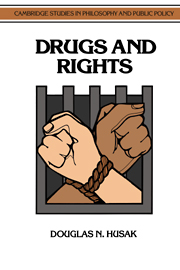4 - Restrictions on drug use
Published online by Cambridge University Press: 05 June 2012
Summary
Thus far I have provided reasons to doubt that criminal laws against the use of recreational drugs (LAD) are justified in their full generality, that is, that recreational drug use should be totally prohibited. My conclusion is incompatible with the way drugs are treated under federal law today. Except for a handful of exemptions, most notably for alcohol and tobacco, the Controlled Substances Act punishes the recreational use of drugs altogether. State law is only slightly more permissive. Eleven states have decriminalized the use and possession of small amounts of marijuana, although they continue to treat it as a noncriminal violation resembling a parking or speeding ticket. Alaska has recently ended its more radical experiment with the removal of all penalties for the private use of marijuana. Apart from these few exceptions, the recreational use of drugs is a criminal offense. Recreational drug use is not permitted under some circumstances, in some places, at some times, by some persons.
In this chapter, I will assume that my arguments from Chapters 2 and 3 are sound and that harm either to drug users or to others does not justify LAD in its full generality. The arguments in favor of a moral right to use drugs recreationally are more persuasive than the arguments against such a right. Respect for moral rights requires that recreational drug use should be decriminalized. This word means different things to different people. The core meaning is that punishment should not be imposed for recreational drug use. LAD should be repealed or, at the very least, unenforced.
- Type
- Chapter
- Information
- Drugs and Rights , pp. 209 - 256Publisher: Cambridge University PressPrint publication year: 1992

